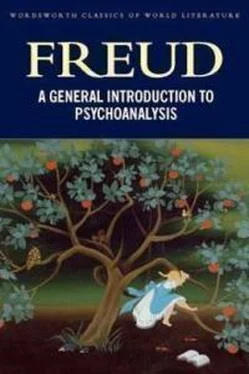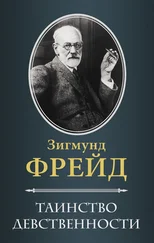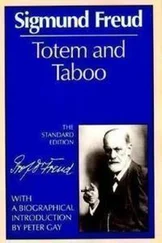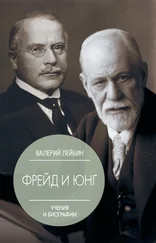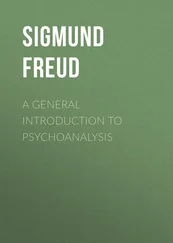To be sure, even we shall find it necessary to explain to ourselves why there are so many dreams of painful content, and especially dreams of fear. We see here, for the first time, the problem of the affects in the dream, a problem worthy of separate investigation, but which unfortunately cannot be considered here. If the dream is a wish–fulfillment, painful experiences ought to be impossible in the dream; in that the lay–critics apparently are right. But three complications, not thought of by them, must be taken into consideration.
First: It may be that the dream work has not been successful in creating a wish–fulfillment, so that a part of the painful effect of the dream–thought is left over for the manifest dream. Analysis should then show that these thoughts were far more painful even than the dream which was built out of them. This much may be proved in each instance. We admit, then, that the dream work has not achieved its purpose any more than the drink–dream due to the thirst–stimulus has achieved its purpose of satisfying the thirst. One remains thirsty, and must wake up in order to drink. But it was a real dream, it sacrificed nothing of its nature. We must say: "Although strength be lacking, let us praise the will to do." The clearly recognizable intention, at least, remains praiseworthy. Such cases of miscarriage are not unusual. A contributory cause is this, that it is so much more difficult for the dream work to change affect into content in its own sense; the affects often show great resistance, and thus it happens that the dream work has worked the painful content of the dream–thoughts over into a wish–fulfillment, while the painful affect continues in its unaltered form. Hence in dreams of this type the affect does not fit the content at all, and our critics may say the dream is so little a wish–fulfillment that a harmless content may be experienced as painful. In answer to this unintelligible remark we say that the wish–fulfillment tendency in the dream–work appears most prominent, because isolated, in just such dreams. The error is due to the fact that he who does not know neurotics imagines the connection between content and affect as all too intimate, and cannot, therefore, grasp the fact that a content may be altered without any corresponding change in the accompanying affect–expression.
A second, far more important and more extensive consideration, equally disregarded by the layman, is the following: A wish–fulfillment certainly must bring pleasure—but to whom? Naturally, to him who has the wish. But we know from the dreamer that he stands in a very special relationship to his wishes. He casts them aside, censors them, he will have none of them. Their fulfillment gives him no pleasure, but only the opposite. Experience then shows that this opposite, which must still be explained, appears in the form of fear. The dreamer in his relation to his dream–wishes can be compared only to a combination of two persons bound together by some strong common quality. Instead of further explanations I shall give you a well–known fairy tale, in which you will again find the relationships I have mentioned. A good fairy promises a poor couple, husband and wife, to fulfill their first three wishes. They are overjoyed, and determine to choose their three wishes with great care. But the woman allows herself to be led astray by the odor of cooking sausages emanating from the next cottage, and wishes she had a couple of such sausages. Presto! they are there. This is the first wish–fulfillment. Now the husband becomes angry, and in his bitterness wishes that the sausages might hang from the end of her nose. This, too, is accomplished, and the sausages cannot be removed from their new location. So this is the second wish–fulfillment, but the wish is that of the husband. The wife is very uncomfortable because of the fulfillment of this wish. You know how the fairy tale continues. Since both husband and wife are fundamentally one, the third wish must be that the sausages be removed from the nose of the wife. We could make use of this fairy tale any number of times in various connections; here it serves only as an illustration of the possibility that the wish–fulfillment for the one personality may lead to an aversion on the part of the other, if the two do not agree with one another.
It will not be difficult now to come to a better understanding of the anxiety–dream. We shall make one more observation, then we shall come to a conclusion to which many things lead. The observation is that the anxiety dreams often have a content which is entirely free from distortion and in which the censorship is, so to speak, eluded. The anxiety dream is ofttimes an undisguised wish–fulfillment, not, to be sure, of an accepted, but of a discarded wish. The anxiety development has stepped into the place of the censorship. While one may assert of the infantile dream that it is the obvious fulfillment of a wish that has gained admittance, and of the distorted dream that it is the disguised fulfillment of a suppressed wish, he must say of the anxiety dream that the only suitable formula is this, that it is the obvious fulfillment of a suppressed wish. Anxiety is the mark which shows that the suppressed wish showed itself stronger than the censorship, that it put through its wish–fulfillment despite the censorship, or was about to put it through. We understand that what is wish–fulfillment for the suppressed wish is for us, who are on the side of the dream–censor, only a painful sensation and a cause for antagonism. The anxiety which occurs in dreams is, if you wish, anxiety because of the strength of these otherwise suppressed wishes. Why this antagonism arises in the form of anxiety cannot be discovered from a study of the dream alone; one must obviously study anxiety from other sources.
What holds true for the undistorted anxiety dream we may assume to be true also of those dreams which have undergone partial distortion, and of the other dreams of aversion whose painful impressions very probably denote approximations of anxiety. The anxiety dream is usually also a dream that causes waking; we habitually interrupt sleep before the suppressed wish of the dream has accomplished its entire fulfillment in opposition to the censorship. In this case the execution of the dream is unsuccessful, but this does not change its nature. We have likened the dream to the night watchman or sleep–defender who wishes to protect our sleep from being disturbed. The night watchman, too, sometimes wakes the sleeper when he feels himself too weak to drive away the disturbance or danger all by himself. Yet we are often able to remain asleep, even when the dream begins to become suspicious, and begins to assume the form of anxiety. We say to ourselves in our sleep: "It's only a dream," and we sleep on.
When does it happen that the dream–wish is in a position to overpower this censorship? The conditions for this may be just as easily furnished by the dream–wish as by the dream–censorship. The wish may, for unknown reasons, become irresistible; but one gets the impression that more frequently the attitude of the dream censorship is to blame for this disarrangement in the relations of the forces. We have already heard that the censorship works with varying intensity in each single instance, that it handles each element with a different degree of strictness; now we should like to add the proposition that it is an extremely variable thing and does not exert equal force on every occasion against the same objectionable element. If on occasion the censorship feels itself powerless with respect to a dream–wish which threatens to over–ride it, then, instead of distortion, it makes use of the final means at its disposal, it destroys the sleep condition by the development of anxiety.
And now it occurs to us that we know absolutely nothing yet as to why these evil, depraved wishes are aroused just at night, in order that they may disturb our sleep. The answer can only be an assumption which is based on the nature of the condition of sleep. During the day the heavy pressure of a censorship weighs upon these wishes, making it impossible, as a rule, for them to express themselves in any manner. At night, evidently, this censorship is withdrawn for the benefit of the single sleep–wish, in the same manner as are all the other interests of psychic life, or at least placed in a position of very minor importance. The forbidden wishes must thank this noctural deposition of the censor for being able to raise their heads again. There are nervous persons troubled with insomnia who admit that their sleeplessness was in the beginning voluntary. They did not trust themselves to fall asleep, because they were afraid of their dreams, that is, of the results due to a slackening of the censorship. So you can readily see that this withdrawal of the censor does not in itself signify rank carelessness. Sleep weakens our power to move; our evil intentions, even if they do begin to stir, can accomplish nothing but a dream, which for practical purposes is harmless, and the highly sensible remark of the sleepers, a night–time remark indeed, but not a part of the dream life, "it is only a dream," is reminiscent of this quieting circumstance. So let us grant this, and sleep on.
Читать дальше
